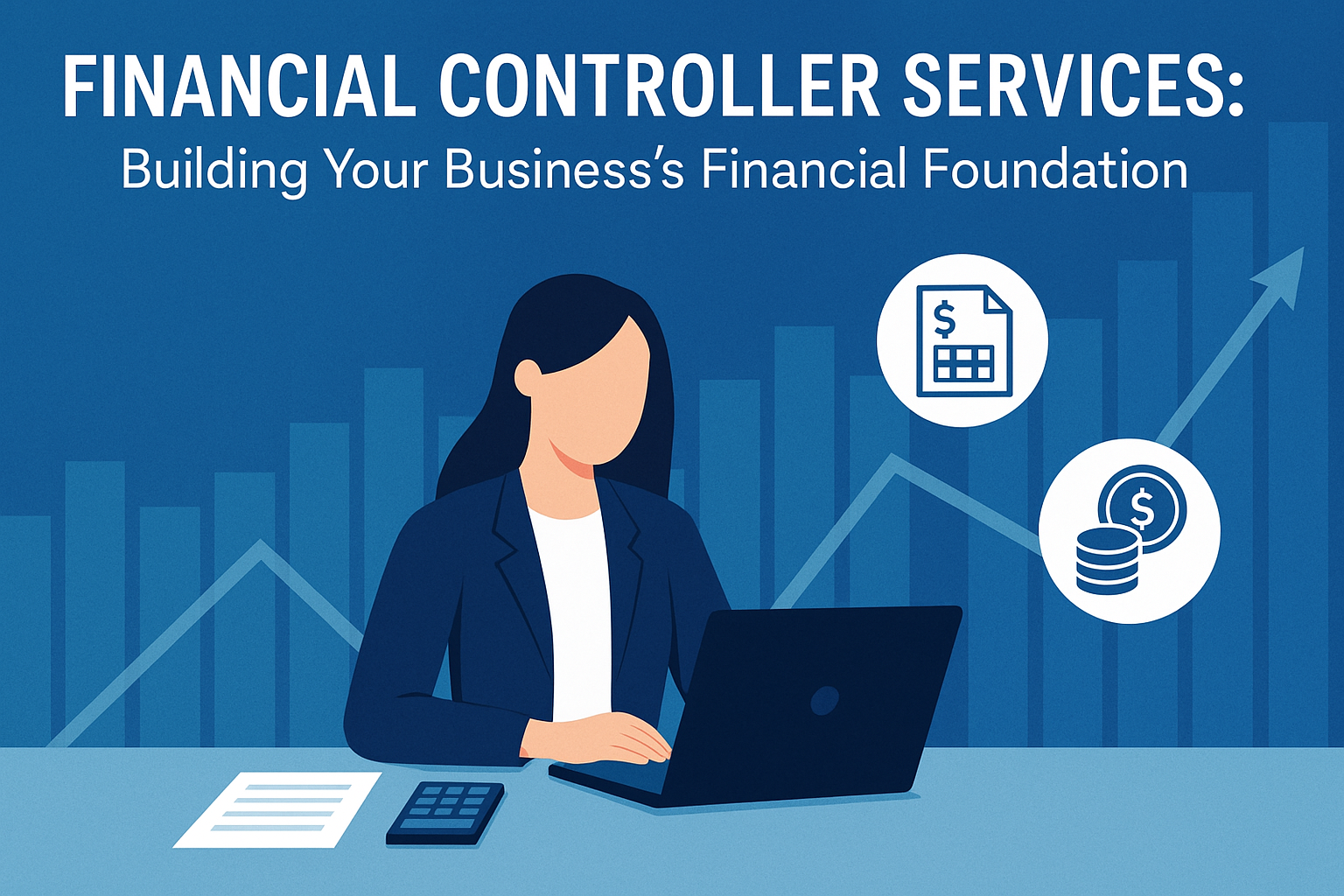📊 Financial Controller Services: Building Your Business’s Financial Foundation
🔍 Introduction
Where a CFO provides high-level strategy, a Financial Controller ensures the financial trains run on time, every day. Often called the backbone of a company’s finance department, controllers are responsible for accurate accounting, timely financial reporting, and efficient processes.
If you’ve ever scrambled during month-end close or spotted errors in your financial statements, then you’ve felt the need for strong controller services. This blog explores what financial controllers do, how they differ from CFOs and bookkeepers, and why controller services are crucial for businesses aiming to build a solid financial foundation.
🧾 What Does a Financial Controller Do?
A financial controller is essentially the chief accountant of your organization. They oversee the accounting team, maintain the general ledger, and produce the company’s financial statements. Their mission: ensure your financial records are accurate, complete, and compliant.
- 💼 Managing Day-to-Day Finances: Supervise bookkeeping, AP/AR, payroll, and all financial transactions. They’re often called the “company historian.”
- 📅 Closing the Books and Reporting: Lead the monthly and annual close process, reconcile accounts, and generate accurate financial statements.
- ✅ Ensuring Compliance and Controls: Implement internal controls and policies to prevent fraud, ensure GAAP compliance, and maintain financial integrity.
- 📊 Financial Analysis and Budgeting: Analyze variances, manage budgets, and support cost-control initiatives and CFO-led strategic decisions.
- 💰 Cash Flow Oversight: Track daily ins and outs, monitor balances, and sometimes manage treasury functions like credit lines and investor draws.
In short, controllers translate daily business activities into accurate financial data – the foundation for informed decision-making.
🔍 Controllers vs. CFOs vs. Bookkeepers: Key Differences
Each role operates at a different altitude within your financial structure:
- 🧾 Bookkeeper: Handles data entry, bills, invoices, payroll. Focused on transactions.
- 📋 Controller: Manages bookkeepers, ensures data accuracy, prepares financial reports, enforces policies, and ensures compliance.
- 📈 CFO: Uses controller’s reports to guide long-term strategy, fundraising, investments, and external communications.
As companies scale, these roles evolve. A controller eventually becomes essential so that the CFO can focus on strategy rather than operations. Typically, the controller reports to the CFO or directly to the CEO if no CFO is in place.
🛠️ When and Why to Engage Controller Services
You likely need controller services if your business:
- ⏳ Lacks Timely, Accurate Financials: If month-end takes forever or the reports don’t add up, a controller brings order.
- 🔁 Has Recurring Errors or Surprises: A controller’s meticulous systems reduce errors and improve record-keeping.
- 🚀 Is Scaling Quickly: As transactions increase, a controller can streamline workflows, staff up, or upgrade systems.
- 📑 Prepares for Audits or Investors: Controllers ensure your financials are audit-ready and investor-grade.
- 💸 Faces Cash Flow Challenges: Daily monitoring, forecasting, and scheduling from a controller prevents nasty surprises.
You don’t always need to hire full-time — outsourced or fractional controllers offer professional oversight without the cost of a full hire.
📉 How Controllers Solve Financial Pain Points
- “I don’t know where my money is going.” Controllers implement expense tracking and detailed financial reporting so you know exactly where every rupee or dollar flows.
- 🔍 Unclear Gross or Net Profit: They ensure revenue, COGS, and expenses are accurately recorded — making profitability crystal clear.
- 💰 Profitable on Paper, But Cash-Starved: Controllers prepare both accrual and cash-based reports to explain why profit doesn’t equal liquidity — then help fix it.
- 🕒 Slow Financial Reporting: They streamline the month-end close with automation and better processes so you get faster insights.
Controllers bring structure, control, and reliability to your business finances. They’re guardians of accuracy and prevent both errors and fraud.
🎯 Conclusion: Why Controller Services Matter
A capable financial controller is the unsung hero of growing businesses. They ensure your numbers are right, your processes are solid, and your reports are timely. With a strong controller in place, CFOs can focus on strategy — and business owners can make decisions with confidence.
Whether you hire in-house or outsource, controller services are an investment in clarity, compliance, and peace of mind. Remember: flashy metrics mean nothing if the underlying numbers are wrong.
A controller ensures your company’s financial truth is always visible — and reliable.


